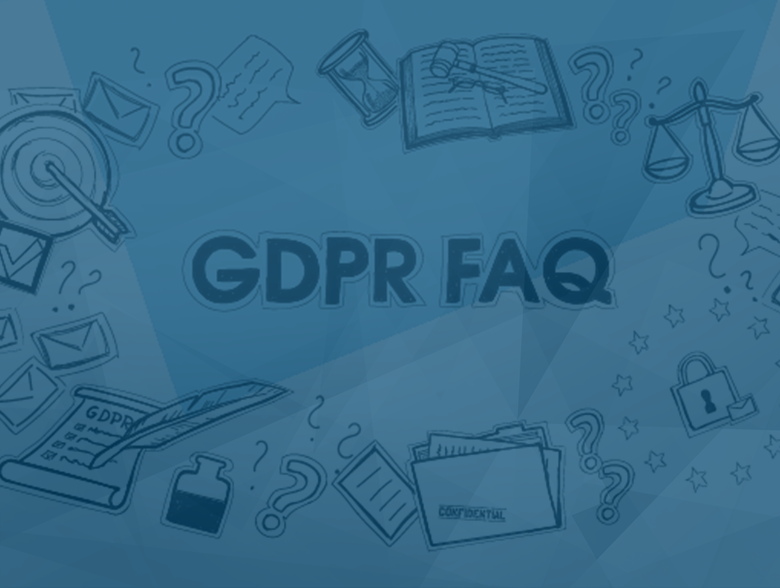Understand the limits of data consent when sending cold emails
By Tim Green, Cybersecurity Specialist
Cold emailing is an important marketing technique for any business that depends on reaching new, unknown prospects for growth.
However, with both individuals and governments becoming significantly more concerned with the ethical use of personal data, running large and successful email campaigns isn’t as simple as it once was.
Any company that uses email marketing in the European market must stay compliant with the General Data Protection Regulation, both to ensure a trustworthy relationship with their customers, and avoid the devastating legal consequences of GDPR violations.
In this post, we’ll take a closer look at what GDPR means in the context of email marketing, and the steps that companies like yours must take to ensure cold email compliance.
Firstly, What is GDPR?
GDPR stands for General Data Protection Regulation, a piece of legislation passed by the EU in 2018. It was issued, in part, to address public concerns about the way companies use people’s personal information for digital marketing purposes, and protect the personal data of people living in EU member states.
To ensure GDPR compliance, companies need to take a proactive approach to the way they handle and use people’s personal data, including peoples’ email addresses, names, location data, device IPs, and more.
Though it may seem like the average consumer hands their data out with a fairly casual attitude, studies conducted a full 2 years after GDPR was rolled out show that a huge 41% of EU citizens “do not want to share any personal data with private companies, almost double the number compared to public bodies”.
It’s also worth noting that if you’re found to be in violation of GDPR, you could incur a fine of up to €20 million ($20.6 million) or 4% of your annual turnover, whichever happens to be greater.
If you have any interaction with the European market that involves gathering personal data from EU citizens, then ensuring GDPR compliance is a non-negotiable must.
With this in mind, let’s look at some of the practical steps you can apply to your cold email campaigns to keep them within GDPR’s stringent parameters.
Review the Reasons Why You’re Targeting your Prospects
One of the first things to look at when you’re reviewing your GDPR compliance is whether or not you have a clear, legitimate purpose for gathering the data you use in your cold email campaigns.
According to GDPR, any personal data that you use needs to be strictly necessary for purpose. This means that if you’re gathering any data that goes past what’s adequate for the purposes of a cold email campaign, for example people’s home addresses, you’ll be in breach of the law.
Just like the kinds of data you gather, you also need to have a good explanation in place for the people you gather data on.
If the prospects you’re emailing have associations with a certain business niche with close ties to the product you’re selling, or have published social media posts that mark them as a member of your ideal audience, then you should be clean from a GDPR standpoint. If, however, you’re retaining personal data on prospects who aren’t relevant to your business, there’s a chance that you could be in violation of GDPR.
For more support on checking that you’re compliant with the purpose limitations of GDPR, check out this detailed guide from the British Information Commissioner’s Office.
Understand How You’re Gathering Data
GDPR isn’t just concerned about the data that you’re storing, but also the methods you use for gathering it. To ensure total compliance, you need to be keeping thorough records of how you acquire your data, and ensuring that you’re sticking to ethical and legal methods.
Though many brands that carry out cold email campaigns will buy their data from aggregators to bolster the diversity and value of their opt-in lists, it’s still the company’s responsibility to ensure that those sources are using ethical and GDPR-compliant means to acquire names and email addresses.
One of the more effective ways to ensure your personal data acquisition is both ethical and legal is to use quality agencies or prospecting platforms with data gathering features baked into their service. Many reputable prospecting platforms such as Outbase pride themselves on having stringent data gathering standards, and apply “a combination of powerful automation and manual checks to ensure data quality”.
Though filtering your data through purpose-built platforms like this is a good start, remember that the responsibility to know and justify your methods of gathering data ultimately rests on your shoulders. Be sure to organize your records so that if any contact approaches you and asks how you acquired their email address, workplace, or any other data, you’ll be able to answer them in detail.
Use Email Templates that Explain your Legitimate Interest
According to GDPR, any company that stores and uses personal data must be able to demonstrate a legitimate interest, meaning a good reason to contact your prospects that makes sense in the context of your business.
When you’re holding personal data in order to execute cold email campaigns, there are a number of reasons that can count as legitimate interest and keep you GDPR compliant, including:
- You’re messaging people about a product or service that will help them fulfill their goals.
- The contact is known to be growing their business, and the product or service you’re trying to market will help them do this.
- You’ve contacted the prospect previously through your own professional network.
- Your prospect has voiced a desire to expand into a business sector that’s relevant to your product or service.
- The prospect has explicitly contacted you asking for more information about the relevant product or service.
Whatever the justification, it’s important to keep your contacts informed to ensure all-around compliance with GDPR. To do this, build email copy templates that include a brief statement letting recipients know how their data has been processed, your legitimate reason why you’re processing it, and simple instructions letting people know how they can change or remove their stored data should they wish to.
Covering all these points in disclaimer copy can be challenging if you have a fairly diverse audience, but after it’s applied to enough campaigns, you should have a decent arsenal of go-to templates appropriate for every relevant audience segment.
Don’t Put Up Walls Between your Contacts and Unsubscribing
As part of GDPR, the EU guarantees a “right to be forgotten” in regard to peoples’ personal data, and you need to do your part to uphold this when sending cold emails.
Though in past years companies would often make subscribers jump through dozens of “are you sure?” hoops before finally removing their details from a database, these kinds of practices are now a sure-fire way to get fined under GDPR regulations.
The best way to make sure you’re guaranteeing your contacts’ right to be forgotten is to use a prominent unsubscribe button as a universal element in all your cold email templates, and ensure that it will work with one touch for all your audience segments.
Popular email marketing suites such as Mailchimp offer replicate template features which will make it easy to implement core elements for GDPR compliance (such as your unsubscribe button and legitimate interest copy) to a single starter template. Once all the right elements are in place, the template can be duplicated and edited according to the specifics of the campaign, ensuring that every new marketing initiative has basic compliance taken care of.
Establish a Database Maintenance Regimen
Last, but not least, GDPR stipulates that you can’t retain leads for a longer time than is necessary, and that you can’t maintain incorrect data on the contacts that are in your database.
If you can’t remember the last time your CRM was checked for outdated data, then it’s time to schedule monthly or quarterly update sessions that will keep it clean and compliant. This should involve deleting any data from people who have unsubscribed, ensuring that source tags are both accurate and formatted in a standardized way, and updating the pipeline stage a contact is at.
Seeing as you’re reading this guide, there’s a chance that some of these metrics may be head-scratchers for the people in charge of your database, or that your records might have a lack of consistency that makes them especially hard to navigate. To avoid these kinds of problems in the future, we strongly recommend that you establish and enforce a data standardization process.
Data standardization processes are sets of rules and best practices that stipulate how data should be entered into a CRM, including mandatory fields such as the time a new contact was logged, their email address, data source, etc.
When all your future data acquisition follows a data standardization process, maintaining your database in a way that’s both intuitive and GDPR-friendly will become much easier, and allow you to circumvent the hard work that comes with manual database maintenance.
Final Thoughts…
GDPR compliance can feel like a headache at the best of times, but it’s essential to ensure the long-term success of your cold email marketing. As you navigate GDPR stipulations and fine-tune your email campaigns for transparency and legality, we hope these steps make your path towards total compliance that much easier.
About the Author
 Tim Green is a cybersecurity specialist. Tim Green has a MSc in Advanced Computer Science. Tim has expanded his knowledge and skillset through a number of roles and is now looking to connect with equally passionate professionals in the cybersecurity sector. Connect with Tim on Twitter: @TimGreenCyber.
Tim Green is a cybersecurity specialist. Tim Green has a MSc in Advanced Computer Science. Tim has expanded his knowledge and skillset through a number of roles and is now looking to connect with equally passionate professionals in the cybersecurity sector. Connect with Tim on Twitter: @TimGreenCyber.
Tim Green can be reached online at www.linkedin.com/in/timgreencyber


